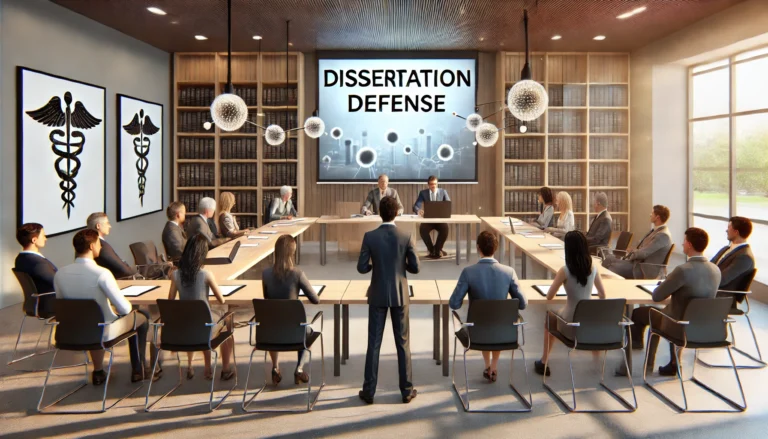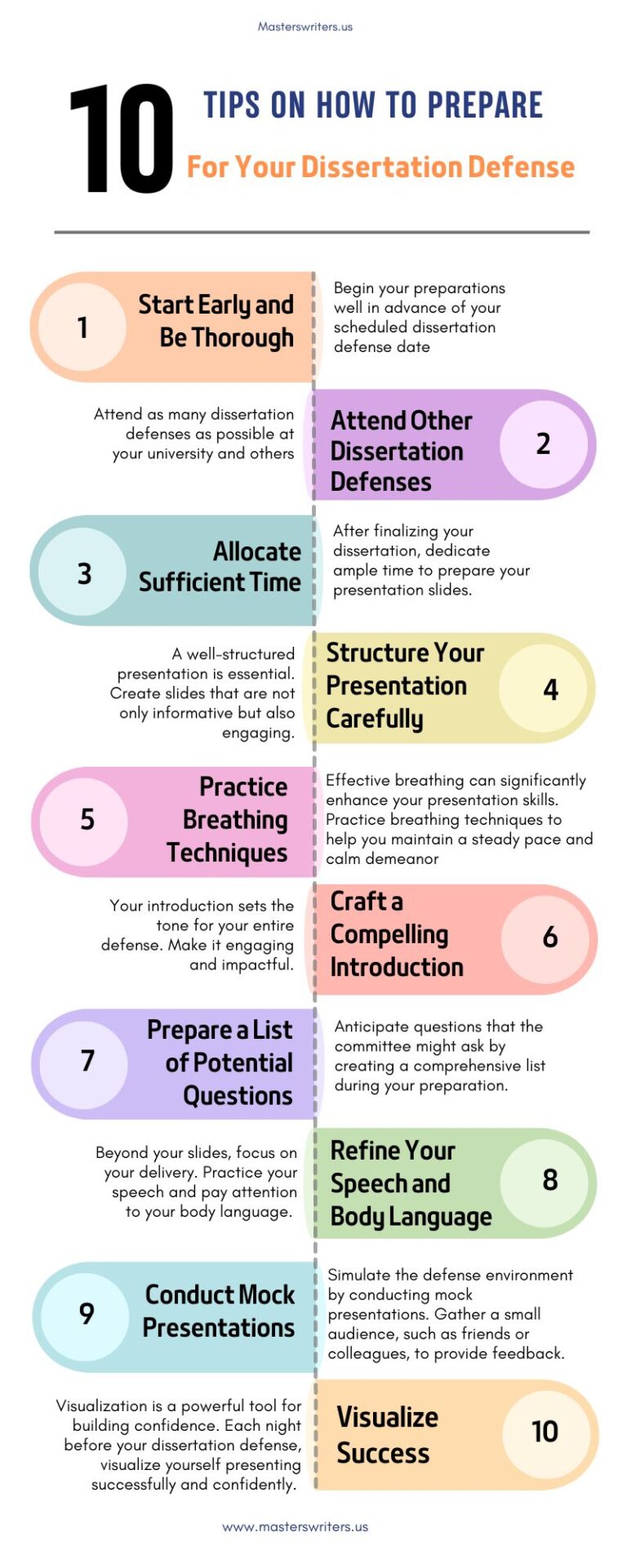Dissertation Guide
10 Tips to Prepare for Your Dissertation Defense


Preparing for a dissertation defense can be a daunting yet exciting milestone in your academic journey. The dissertation defense is critical to earning a PhD or master’s, where you present your research findings to a committee of experts. This process demonstrates your knowledge and understanding of your research topic and showcases your ability to defend your work under scrutiny. From understanding the format and expectations to mastering your presentation skills, preparing for this pivotal event is essential.
This comprehensive guide will delve into various aspects of the dissertation defense, offering tips and insights on successfully navigating this crucial academic hurdle. Whether you’re wondering about the typical defense length, the types of questions you might face, or how to ensure you pass with flying colors, we’ve got you covered.
What is A Dissertation Defense
A dissertation defense is a formal event in which a master’s or PhD candidate presents their research findings to a committee of faculty members and experts. During the defense, the candidate must explain and justify their research methodology, data analysis, and conclusions while answering questions posed by the defense committee. This process evaluates the candidate’s understanding of their research topic and ability to defend their work under critical examination. Successfully passing the dissertation defense is one of the final steps toward earning a doctoral or master’s degree.

Defend Your Dissertation with Confidence
Let us support you through this crucial milestone and help you prepare for your dissertation defense with expert guidance and resources.
How long is a Dissertation Defense
The length of a dissertation defense can vary widely depending on the institution, the field of study, and the program’s specific requirements. Typically, a dissertation defense lasts between one to two hours. During this time, the candidate presents an overview of their research, followed by a question-and-answer session with the committee. Some defenses may be shorter or longer, depending on the complexity of the study and the depth of questioning by the committee members.
20 Common Dissertation Defense Questions
- What motivated you to choose this research topic?
- Can you summarize your dissertation in a few sentences?
- What are the main findings of your research?
- How does your research contribute to your field’s existing body of knowledge?
- What research methods did you use, and why did you choose them?
- Can you discuss any limitations of your study and how they might impact your findings?
- How did you select your sample, and what criteria did you use?
- Can you explain your data analysis process in detail?
- What theoretical framework underpins your research?
- How do your findings compare with previous research in the same area?
- What are the practical implications of your research?
- How did you address potential biases in your study?
- Can you discuss any ethical considerations related to your research?
- What challenges did you encounter during your research, and how did you overcome them?
- How do you plan to disseminate your research findings?
- What future research directions do you suggest based on your findings?
- Can you explain any unexpected results you encountered?
- How did you ensure the reliability and validity of your data?
- How does your research address the gaps identified in the literature review?
- What recommendations do you have for practitioners based on your research findings?
What Should You Expect at Your Dissertation Defense?
When preparing for your dissertation defense, it’s crucial to understand that different universities and committees have their norms and expectations. Your best strategy is to consult with your adviser to understand what is expected clearly. Generally, the defense will start with an introduction by your major professor, which could range from a brief overview to a more detailed account of your academic journey. Be prepared for the possibility of a personal anecdote or a quick handover to you for the presentation.
The oral presentation of your dissertation is a critical component of the dissertation defense. The length and format of this presentation can vary, so it’s essential to clarify these details with your adviser and committee in advance. You might be required to give a 20 to 30-minute presentation or jump straight into a question-and-answer session. During your presentation, cover the basics, such as the questions you started with, your key findings, what you accomplished, any unexpected results, future research directions, and most importantly, your contribution to the field. Tailor your presentation to your audience, ensuring it is accessible to the committee members and any general audience present.
The Q&A session is often the most unpredictable part of the dissertation defense. This is when the committee will challenge you with questions about your research. It’s natural to feel nervous but remember that you have been invited to defend because your committee believes you are ready. Some questions may be challenging, but they are meant to test your knowledge and the robustness of your research. As the session wraps up, ensure you understand any required revisions and next steps before submission. Finally, the committee will deliberate privately to decide whether to pass your dissertation as is, require minor modifications, or ask for significant revisions.
10 Tips on How to Prepare for Your Dissertation Defense

- Start Early and Be Thorough
Begin your preparations well in advance of your scheduled dissertation defense date. Don’t wait until you’ve completed all your research; instead, familiarize yourself with every detail of your dissertation as you progress. Understanding the intricacies of your work and the rationale behind your experiments is crucial for a successful defense. - Attend Other Dissertation Defenses
Attend as many dissertation defenses as possible at your university and others. This exposure will demystify the process, showing you it’s manageable and providing insights into effective defense strategies. Observing other defenses will also help you understand the types of questions asked and the event’s overall atmosphere. - Allocate Sufficient Time for Slide Preparation
After finalizing your dissertation, dedicate ample time to prepare your presentation slides. Ensure your slides are clear, concise, and logically organized. Include critical data points, rephrase complex inferences for clarity, and maintain a flow that makes your presentation easy to follow. Well-prepared slides can significantly enhance the impact of your defense. - Structure Your Presentation Carefully
A well-structured presentation is essential. Create slides that are not only informative but also engaging. Use high-quality visuals and smart art to maintain the audience’s attention. Ensure your presentation is thorough, accurate, and easy to follow, providing a straightforward narrative of your research journey. - Practice Breathing Techniques
Effective breathing can significantly enhance your presentation skills. Practice breathing techniques to help you maintain a steady pace and calm demeanor. Watching TED talks can help observe effective breathing and speaking techniques. Practice long, steady breaths to ensure you speak clearly and confidently. - Craft a Compelling Introduction
Your introduction sets the tone for your entire defense. Make it engaging and impactful, addressing key questions and capturing the audience’s attention. A strong opening will create a positive first impression and set a confident tone for the rest of your presentation. - Prepare a List of Potential Questions
Anticipate questions that the committee might ask by creating a comprehensive list during your preparation. Consider the perspective of someone unfamiliar with your topic and what they might want to know. This preparation will help you respond confidently and thoughtfully during the Q&A session. - Refine Your Speech and Body Language
Beyond your slides, focus on your delivery. Practice your speech and pay attention to your body language. Stand straight, relax your shoulders, and maintain a confident posture. Observing yourself in a mirror or recording practice sessions can help refine your presentation style. - Conduct Mock Presentations
Simulate the defense environment by conducting mock presentations. Gather a small audience, such as friends or colleagues, to provide feedback. This practice will help you get accustomed to presenting your research and responding to questions under similar conditions to the actual defense. - Visualize Success
Visualization is a powerful tool for building confidence. Each night before your dissertation defense, visualize yourself presenting successfully and confidently. This mental rehearsal can boost your self-assurance and prepare you for the event.
Final Remarks
Successfully defending your dissertation is a significant achievement that marks the culmination of your hard work and dedication. You can easily navigate this vital milestone by preparing thoroughly, practicing diligently, and staying calm and confident. Remember, your committee wants you to succeed, and with the proper preparation, you can effectively showcase your expertise and contributions to your field. Celebrate this moment as it signifies your transition from a student to an expert in your domain.

Feeling the Pressure of Your Dissertation Defense?
Let us handle the preparation details while you focus on delivering a stellar defense!
FAQs
What is a dissertation defense?
A dissertation defense is a formal event where a doctoral candidate presents their research findings to a committee of experts in their field. The candidate must explain their research, methodology, and conclusions and answer questions posed by the committee to demonstrate their knowledge and the validity of their work.
How common is it to fail a dissertation defense?
Failing a dissertation defense is relatively uncommon, as candidates typically reach this stage after extensive preparation and advisor feedback. However, it can happen if the committee feels the research is insufficient or the candidate cannot adequately defend their work. Usually, minor or major revisions are required rather than outright failure.
Do you get a PhD after dissertation defense?
Yes, passing the dissertation defense is one of the final steps in earning a PhD. You will be awarded your doctoral degree once you successfully defend your dissertation and complete any required revisions.
How do you pass a dissertation defense?
To pass a dissertation defense, thoroughly prepare by understanding your research in detail, anticipating potential questions, and practicing your presentation skills. Engage with your committee during the defense, respond to their questions confidently, and demonstrate a deep understanding of your research topic. Preparation, practice, and a calm demeanor are crucial to success.
Sources
American Public University. Dissertation Defense. https://www.apu.apus.edu/student-handbook/doctoral-programs/your-academic-success/your-course-grades-and-apus-transcripts/dissertation-defense/
William & Mary School of Education. Dissertation Defense. https://education.wm.edu/academics/forms/handbooks/dochandbook/dissertation/Dissertation%20defense/

